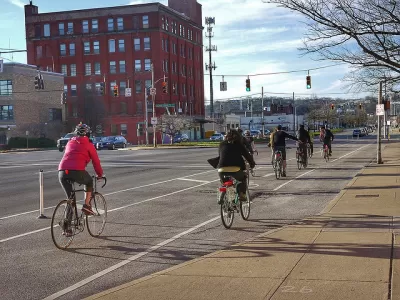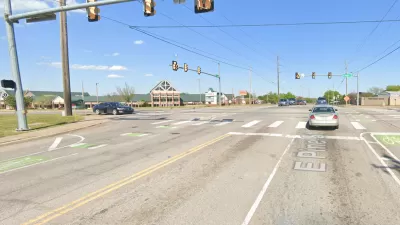Public outcry about the priority given protected bike lanes on streets can be mitigated when civic crowdfunding is part of the planning process, according to this article.

Kate Gasparro writes of the potential for civic crowdfunding to mitigate the "bikelash" that has created controversy when new protected bike lane infrastructure is installed in cities around the country, even leading to the removal of newly installed bike infrastructure in some locations.
"I’ve found that many places that have avoided bikelash as they roll out new protected bike lanes have something in common: a creative approach to cultivating public support" (i.e., crowdfunding), writes Gasparro. "Instead of encouraging residents to attend public meetings, city officials and local civic groups are meeting community members where they live and work."
Gasparro is a graduate research fellow at Stanford University, and these conclusions grow out of research into community engagement that created an "accidental" expertise in bike lanes. Here, Gasparro explains that history and the conclusion offered in this article in more detail:
During a four-year study of civic crowdfunding, I found that this collective fundraising technique has been used to support projects like protected bike lanes in non-monetary ways, such as building consensus. This is often a primary motivation for starting the campaign. The buy-in that crowdfunding brings about often proves far more valuable than any help paying the tab.
This happens because community organizations engage community members around the project. They convene discussions about the project in public spaces and at local businesses. During these events, nearby residents become acquainted with the proposed plans and voice their concerns before it’s too late to change course.
FULL STORY: Civic crowdfunding reduces the risk of ‘bikelash’

Maui's Vacation Rental Debate Turns Ugly
Verbal attacks, misinformation campaigns and fistfights plague a high-stakes debate to convert thousands of vacation rentals into long-term housing.

Planetizen Federal Action Tracker
A weekly monitor of how Trump’s orders and actions are impacting planners and planning in America.

Chicago’s Ghost Rails
Just beneath the surface of the modern city lie the remnants of its expansive early 20th-century streetcar system.

Bend, Oregon Zoning Reforms Prioritize Small-Scale Housing
The city altered its zoning code to allow multi-family housing and eliminated parking mandates citywide.

Amtrak Cutting Jobs, Funding to High-Speed Rail
The agency plans to cut 10 percent of its workforce and has confirmed it will not fund new high-speed rail projects.

LA Denies Basic Services to Unhoused Residents
The city has repeatedly failed to respond to requests for trash pickup at encampment sites, and eliminated a program that provided mobile showers and toilets.
Urban Design for Planners 1: Software Tools
This six-course series explores essential urban design concepts using open source software and equips planners with the tools they need to participate fully in the urban design process.
Planning for Universal Design
Learn the tools for implementing Universal Design in planning regulations.
planning NEXT
Appalachian Highlands Housing Partners
Mpact (founded as Rail~Volution)
City of Camden Redevelopment Agency
City of Astoria
City of Portland
City of Laramie





























